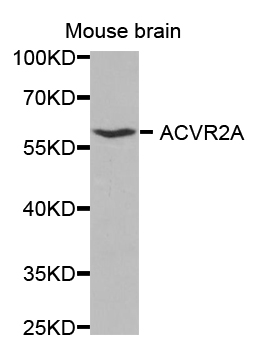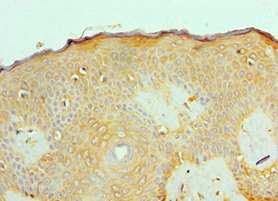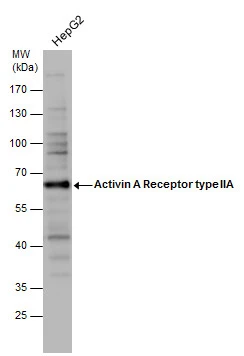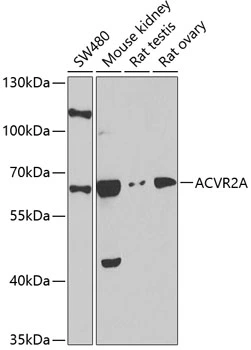![IHC-P analysis of formalin fixed human placenta tissue using GTX52509 Activin Receptor Type IIA antibody [6J16]. IHC-P analysis of formalin fixed human placenta tissue using GTX52509 Activin Receptor Type IIA antibody [6J16].](https://www.genetex.com/upload/website/prouct_img/normal/GTX52509/GTX52509_20191119_IHC-P_w_23060900_259.webp)
IHC-P analysis of formalin fixed human placenta tissue using GTX52509 Activin Receptor Type IIA antibody [6J16].
Activin Receptor Type IIA antibody [6J16]
GTX52509
ApplicationsWestern Blot, ImmunoHistoChemistry, ImmunoHistoChemistry Paraffin
Product group Antibodies
ReactivityHuman
TargetACVR2A
Overview
- SupplierGeneTex
- Product NameActivin Receptor Type IIA antibody [6J16]
- Delivery Days Customer9
- Application Supplier NoteWB: 1:100 - 1:1000. IHC-P: 1:50 - 1:100. *Optimal dilutions/concentrations should be determined by the researcher.Not tested in other applications.
- ApplicationsWestern Blot, ImmunoHistoChemistry, ImmunoHistoChemistry Paraffin
- CertificationResearch Use Only
- ClonalityMonoclonal
- Clone ID6J16
- Concentration200 ug/ml
- ConjugateUnconjugated
- Gene ID92
- Target nameACVR2A
- Target descriptionactivin A receptor type 2A
- Target synonymsACTRII, ACVR2, activin receptor type-2A, activin A receptor, type IIA
- HostMouse
- IsotypeIgG2
- Protein IDP27037
- Protein NameActivin receptor type-2A
- Scientific DescriptionThis gene encodes a receptor that mediates the functions of activins, which are members of the transforming growth factor-beta (TGF-beta) superfamily involved in diverse biological processes. The encoded protein is a transmembrane serine-threonine kinase receptor which mediates signaling by forming heterodimeric complexes with various combinations of type I and type II receptors and ligands in a cell-specific manner. The encoded type II receptor is primarily involved in ligand-binding and includes an extracellular ligand-binding domain, a transmembrane domain and a cytoplasmic serine-threonine kinase domain. This gene may be associated with susceptibility to preeclampsia, a pregnancy-related disease which can result in maternal and fetal morbidity and mortality. Alternative splicing results in multiple transcript variants of this gene. [provided by RefSeq, Jun 2013]
- ReactivityHuman
- Storage Instruction-20°C or -80°C,2°C to 8°C
- UNSPSC41116161








